家庭作业汇总
第二章家庭作业 2.59和2.66
2.59 编写一个C表达式,使它生成一个字,由x的最低有效字节和y的剩下的字节组成。对于运算数x=0x89ABCDEF和y=0x76543210,就得到0x76432EF。
答:(x&0xFF)|(y&~0xFF)
验证:
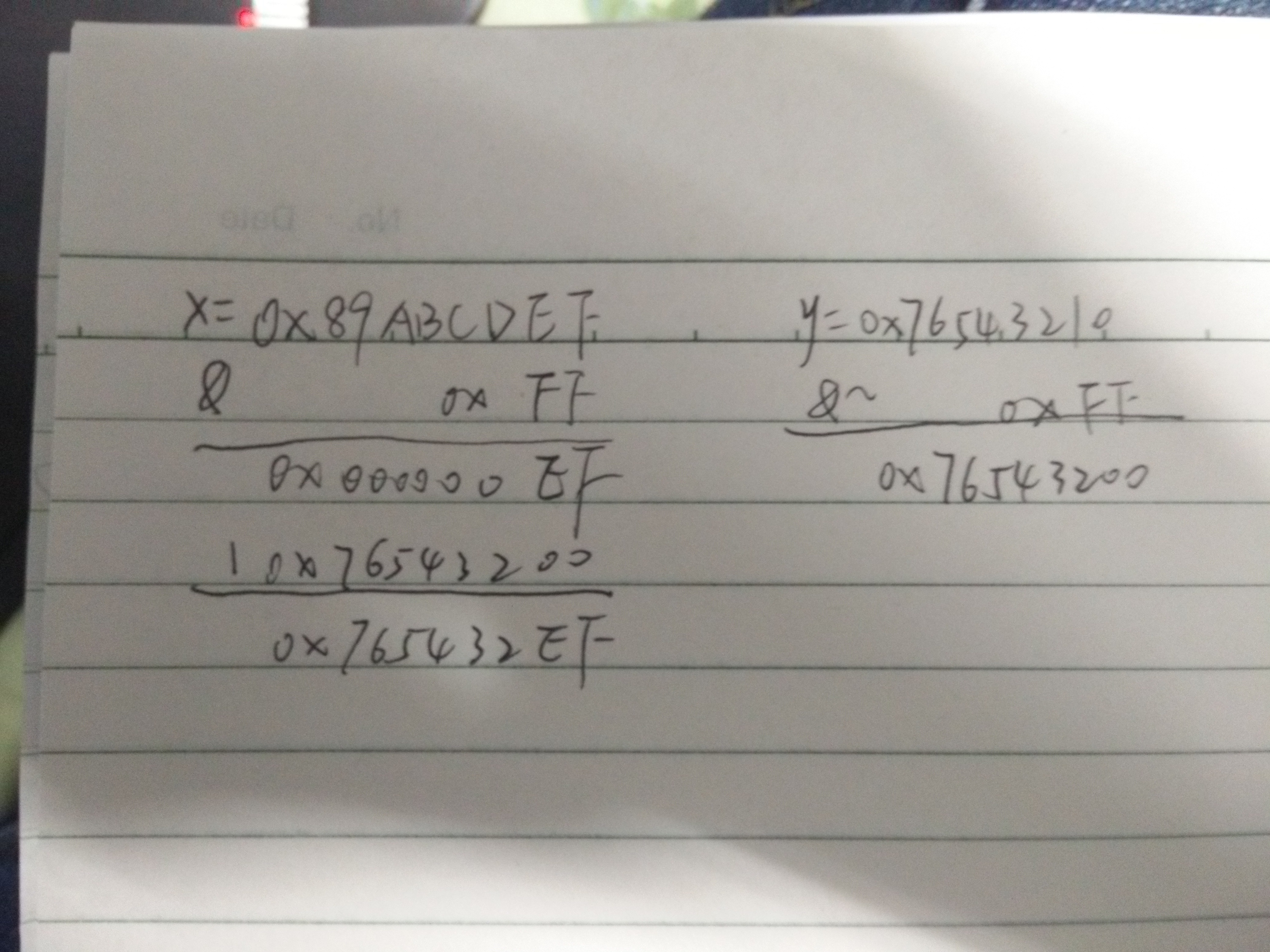
2.66 写出代码实现如下函数:
/*
*Generate mask incicating leftmost 1in x. Assume w=32.
*For example 0xFF00 ->0x8000, and 0x6600 --> 0x4000.
*If x=0,then return 0.
*/
int leftmost_one(unsigned x);
函数应该遵循位级整数编码规则,不过你可以假设数据类型int有w=32位。
你的代码最多只能抱憾15个算术运算、位运算和逻辑运算。
提示:先将x转换成形如[0...011...1]的位置。
答:我根据提示想到利用或运算,将最高位的1或到比它低的每一位上,忽然想如果x就是10000000..该如何让每一位都为1。先是x右移1位再和原x进行或,变成1100000...,再让结果右移2位和原结果或,变成11110000...,最后到16位,变成11111111...。
int leftmost_one(unsigned x){
x |= (x >> 1);
x |= (x >> 2);
x |= (x >> 4);
x |= (x >> 8);
x |= (x >> 16);
return x^(x>>1);
}
第三章家庭作业 3.69和3.70
3.69
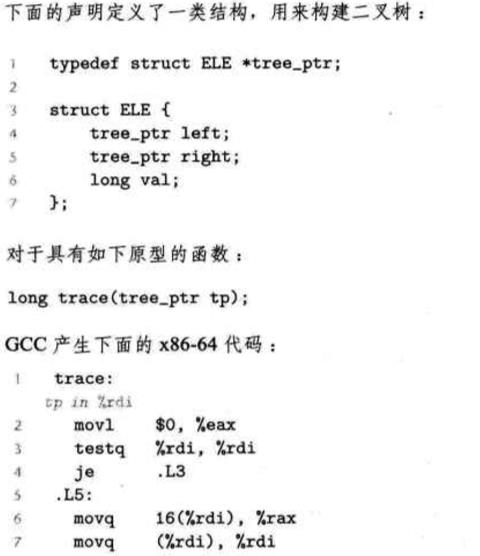
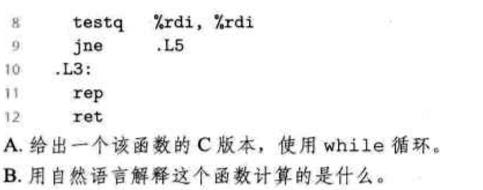
A:long trace(tree_ptr tp)
{
long ret = 0;
while(tp != NULL)
{
ret = tp->val;
tp = tp->left;
}
return ret;
}
B:作用是从根一直遍历左子树,找到第一个没有左子树的节点的值。
3.70
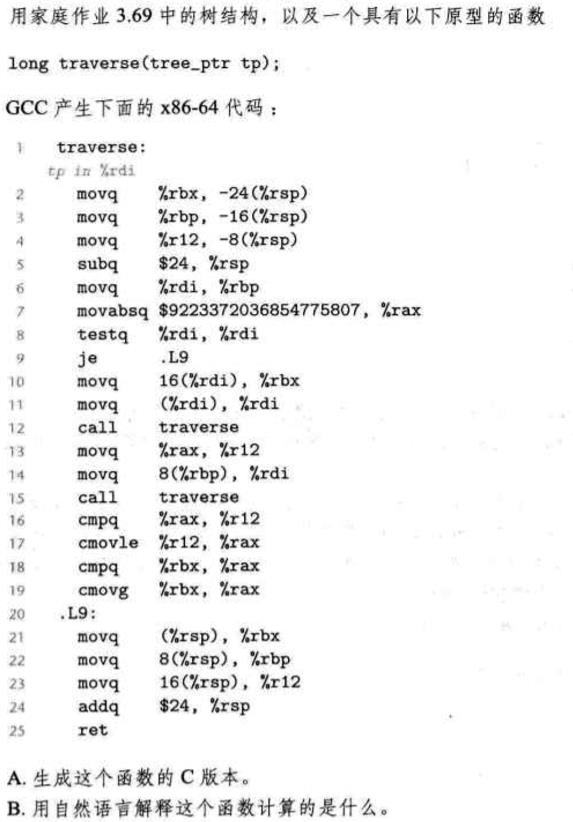
A:long traverse(tree_ptr tp)
{
long v = MAX_LONG;
if(tp != NULL)
{
v = min(traverse(tp->left), traverse(tp->right)); //Line16 cmovle: if(r12<rax) rax=r12;
v = min(v, tp->v); //Line20 cmovle: if(rax>rbx) rax=rbx;
}
return v;
}
B:找到树的所有节点的值中最小的一个。
第六章家庭作业 6.31
6.31
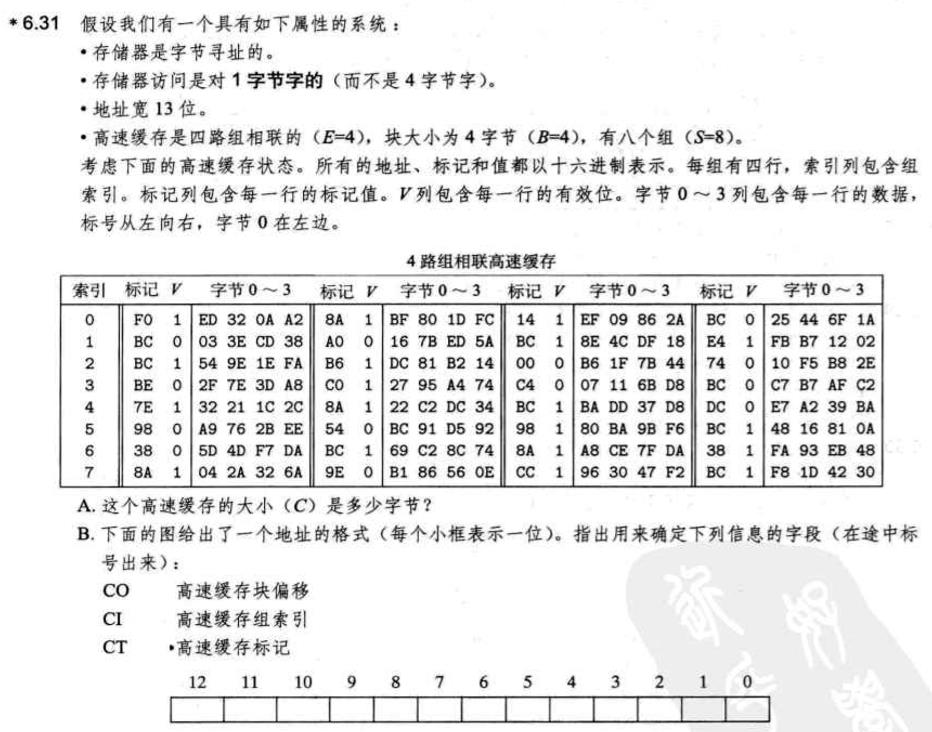
解答:
A. 高速缓存大小C=E*B*S=4*4*8=128 字节
B.
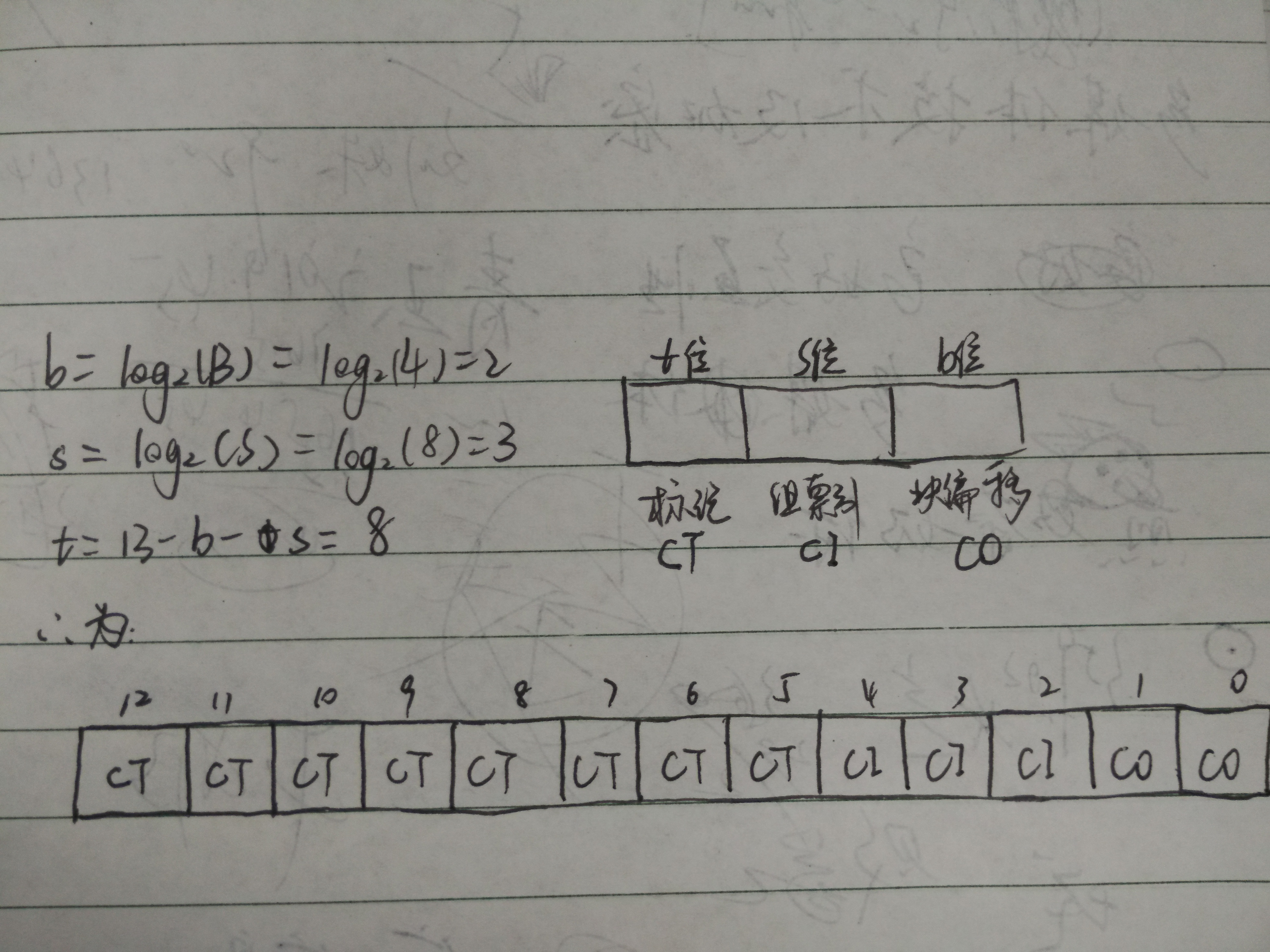
第八章家庭作业 8.19

因为Fork函数被调用一次,但是会返回两次:一次在调用进程(父进程)中(fork返回子进程的PID),一次在新创建的子进程中(fork返回0)。
所以调用Fork函数n次,就会产生2的n次方个进程。即总共会输出2^n行。
第十一章家庭作业 11.7
11.7 拓展TINY,使它可以提供MPG视频文件。用一个真正的浏览器来检验你的工作。
答:在get_filetype函数里面添加:
else if(strstr(filename, ".mpg") || strstr(filename, ".mp4"))
strcpy(filetype, "video/mpg");
源代码:
#include "csapp.h" void doit(int fd); void read_requesthdrs(rio_t *rp); int parse_uri(char *uri, char *filename, char *cgiargs); void serve_static(int fd, char *filename, int filesize); void get_filetype(char *filename, char *filetype); void serve_dynamic(int fd, char *filename, char *cgiargs); void clienterror(int fd, char *cause, char *errnum, char *shorting,char *longmsg); int main(int argc,char *argv[]) { int listenfd,connfd,port,clientlen; struct sockaddr_in clientaddr; if(argc != 2) { fprintf(stderr,"usage: %s <port>\n",argv[0]); exit(0); } port = atoi(argv[1]); listenfd = Open_listenfd(port); while(1) { clientlen = sizeof(clientaddr); connfd = Accept(listenfd, (SA *)&clientaddr, &clientlen); doit(connfd); Close(connfd); } } void doit(int fd) { int is_static; struct stat sbuf; char buf[MAXLINE], method[MAXLINE],uri[MAXLINE],version[MAXLINE]; char filename[MAXLINE],cgiargs[MAXLINE]; rio_t rio; /*read request line and headers*/ Rio_readinitb(&rio, fd); Rio_readlineb(&rio, buf, MAXLINE); sscanf(buf, "%s %s %s", method, uri, version); if(strcasecmp(method,"GET")) { clienterror(fd, method, "501","Not Implemented", "Tiny does not implement this method"); return; } read_requesthdrs(&rio); /*prase URI from GET request*/ is_static = parse_uri(uri, filename, cgiargs); if(stat(filename, &sbuf) < 0) { clienterror(fd, filename, "404","Not Found", "Tiny couldn't find this file"); return; } if(is_static)//server static content { if(!(S_ISREG(sbuf.st_mode) || !(S_IRUSR & sbuf.st_mode))) { clienterror(fd, filename, "403","Forbidden", "Tiny couldn't read the file"); return; } serve_static(fd, filename, sbuf.st_size); } else//server dynamic content { if(!(S_ISREG(sbuf.st_mode) || !(S_IXUSR & sbuf.st_mode))) { clienterror(fd, filename, "403","Forbidden", "Tiny couldn't run the CGI program"); return; } serve_dynamic(fd, filename, cgiargs); } } void clienterror(int fd, char *cause, char *errnum, char *shortmsg, char *longmsg) { char buf[MAXLINE], body[MAXBUF]; /*Build the HTTP response body*/ sprintf(body, "<html><title>Tiny Error</title>"); sprintf(body, "%s<body bgcolor=""ffffff"">\r\n",body); sprintf(body, "%s%s: %s\r\n",body,errnum,shortmsg); sprintf(body, "%s<p>%s: %s\r\n", body, longmsg, cause); sprintf(body, "%s<hr><em>The Tiny Web Server</em><>\r\n",body); /*Print the HTTP response*/ sprintf(buf, "HTTP/1.0 %s %s\r\n",errnum, shortmsg); Rio_writen(fd, buf, strlen(buf)); sprintf(buf, "Content-type: text/html\r\n"); Rio_writen(fd, buf, strlen(buf)); sprintf(buf, "Content-length: %d\r\n\r\n",(int)strlen(body)); Rio_writen(fd, buf, strlen(buf)); Rio_writen(fd, body, strlen(body)); } //read_requesthdrs()来跳过请求报头的信息,直到遇见表示报头结束的空文本行。 void read_requesthdrs(rio_t *rp) { char buf[MAXLINE]; Rio_readlineb(rp, buf, MAXLINE); while(strcmp(buf, "\r\n")) { Rio_readlineb(rp, buf, MAXLINE); printf("%s", buf); } return; } int parse_uri(char *uri, char *filename, char *cgiargs) { char *ptr; if(!strstr(uri, "cgi-bin"))//static content { strcpy(cgiargs, ""); strcpy(filename, "."); strcat(filename, uri); if(uri[strlen(uri)-1] == '/') strcat(uri, "home.html"); return 1; } else { ptr = index(uri, '?'); if(ptr) { strcpy(cgiargs, ptr+1); *ptr = '\0'; } else strcpy(cgiargs, ""); strcpy(filename, "."); strcat(filename, uri); return 0; } } void serve_static(int fd, char *filename, int filesize) { int srcfd; char *srcp, filetype[MAXLINE], buf[MAXBUF]; /*Send response headers to client*/ get_filetype(filename,filetype); sprintf(buf, "HTTP/1.0 200 OK\r\n"); sprintf(buf, "%sServer: Tiny Web Server\r\n", buf); sprintf(buf, "%sContent-lenght: %d\r\n", buf, filesize); sprintf(buf, "%sContent-type: %s\r\n\r\n", buf, filetype); Rio_writen(fd, buf, strlen(buf)); /*Send response body to client*/ srcfd = Open(filename, O_RDONLY, 0); srcp = Mmap(0, filesize, PROT_READ, MAP_PRIVATE,srcfd,0); close(srcfd); Rio_writen(fd, srcp, filesize); Munmap(srcp, filesize); } void get_filetype(char *filename, char *filetype) { if(strstr(filename, ".html")) strcpy(filetype, "text/html"); else if(strstr(filename, ".gif")) strcpy(filetype, "image/gif"); else if(strstr(filename, ".jpg")) strcpy(filetype, "image/jpeg"); else strcpy(filetype, "text/plain"); } void serve_dynamic(int fd, char *filename, char *cgiargs) { char buf[MAXLINE], *emptylist[]={NULL}; /*Return first part of HTTP response*/ sprintf(buf, "HTTP/1.0 200 OK\r\n"); Rio_writen(fd, buf,strlen(buf)); sprintf(buf, "Server: Tiny Web Server\r\n"); Rio_writen(fd, buf,strlen(buf)); if(Fork()==0) { setenv("QUERY_STRING", cgiargs, 1); Dup2(fd, STDOUT_FILENO); Execve(filename, emptylist,environ); } Wait(NULL); }



 浙公网安备 33010602011771号
浙公网安备 33010602011771号